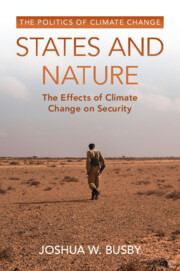Book contents
- States and Nature
- The Politics of Climate Change
- States and Nature
- Copyright page
- Dedication
- Contents
- Figures
- Maps
- Tables
- Acknowledgments
- 1 Introduction
- 2 Conceptualizing Climate and Security
- 3 The Argument, Method, and Mechanisms
- 4 Droughts and Famine in Somalia and Ethiopia
- 5 Drought in the Middle East
- 6 Cyclones in South Asia
- 7 Beyond Internal Conflict
- 8 The Next Decade of Climate Security Research
- 9 Conclusion
- Bibliography
- Index
8 - The Next Decade of Climate Security Research
Published online by Cambridge University Press: 03 March 2022
- States and Nature
- The Politics of Climate Change
- States and Nature
- Copyright page
- Dedication
- Contents
- Figures
- Maps
- Tables
- Acknowledgments
- 1 Introduction
- 2 Conceptualizing Climate and Security
- 3 The Argument, Method, and Mechanisms
- 4 Droughts and Famine in Somalia and Ethiopia
- 5 Drought in the Middle East
- 6 Cyclones in South Asia
- 7 Beyond Internal Conflict
- 8 The Next Decade of Climate Security Research
- 9 Conclusion
- Bibliography
- Index
Summary
The penultimate chapter explores the future of academic inquiry on climate and security and how the field of international relations ought to change. I explore several areas where the climate security field will need to develop new approaches and insights, mostly related to the challenges of writing about the future. This includes: how academics can be useful to policy and the need to move beyond the simple phrase of “thread multiplier”; the significance of the end of “stationarity” and what that means for scholarship going forward; the question of what baselines we use for identifying normal climatic conditions and how far back we can go to identify deep structural drivers; that scholars need to explore more fully the links between human security and state security; and that runaway climate change would make all of these security challenges worse and, hence, mitigation needs to be considered a security concern in its own right. Finally, I suggest that the broader field of political science needs to elevate climate change to a systemic structural factor like anarchy and think about what this means for the discipline and for the world.
Keywords
- Type
- Chapter
- Information
- States and NatureThe Effects of Climate Change on Security, pp. 244 - 265Publisher: Cambridge University PressPrint publication year: 2022

